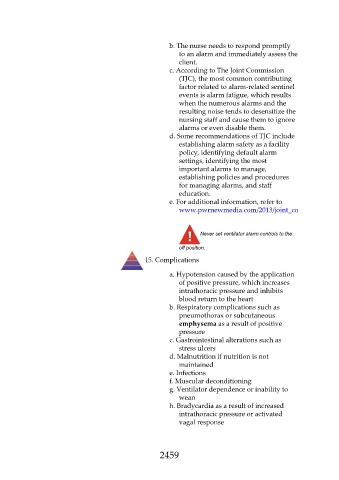Page 2459 - Saunders Comprehensive Review For NCLEX-RN
P. 2459
b. The nurse needs to respond promptly
to an alarm and immediately assess the
client.
c. According to The Joint Commission
(TJC), the most common contributing
factor related to alarm-related sentinel
events is alarm fatigue, which results
when the numerous alarms and the
resulting noise tends to desensitize the
nursing staff and cause them to ignore
alarms or even disable them.
d. Some recommendations of TJC include
establishing alarm safety as a facility
policy, identifying default alarm
settings, identifying the most
important alarms to manage,
establishing policies and procedures
for managing alarms, and staff
education.
e. For additional information, refer to
www.pwrnewmedia.com/2013/joint_commission/medical_alarm_safety/downloads/SEA_50_alarms.pdf
Never set ventilator alarm controls to the
off position.
15. Complications
a. Hypotension caused by the application
of positive pressure, which increases
intrathoracic pressure and inhibits
blood return to the heart
b. Respiratory complications such as
pneumothorax or subcutaneous
emphysema as a result of positive
pressure
c. Gastrointestinal alterations such as
stress ulcers
d. Malnutrition if nutrition is not
maintained
e. Infections
f. Muscular deconditioning
g. Ventilator dependence or inability to
wean
h. Bradycardia as a result of increased
intrathoracic pressure or activated
vagal response
2459

